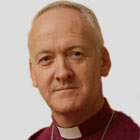Jeffrey John was not the favourite
The stories about Jeffrey John's nomination as bishop of Southwark are mischief-making based on ignorance
So, the Dean of St Albans has been "blocked" from becoming the next Bishop of Southwark. Really? Well, the Telegraph has confidently told us so – so we might as well remove our brains and take their word for it. Or not.
What is amazing about this whole story is not just the shameful behaviour of the leaker (who has sworn an oath of confidentiality), but the credulity of many people who have responded (look, for example, atThinking Anglicans) is depressing. They have accepted the details and language of the story without thinking. And, predictably, the usual suspects from the extremes of the Church were ready with their quotes of indignation and threat.
The Telegraph story last Sunday stated that the candidate concerned was on the shortlist; was the "understood to be the favoured candidate" and suggested that the process was only about him: would he or would he not be appointed? Readers were clearly intended to make certainuncritical leaps of logic that defied the realities of the process. Apparently, being on the shortlist meant that the named candidate was likely to get the appointment; so, if he was not appointed, it could only be that he was deliberately blocked by the Archbishop of Canterbury; oh, and the reason for the "block" could only be the candidate's sexuality.
However, thirty seconds of critical thought would have immediately raised questions about the presentation of the story. The process for nominating diocesan bishops can be studied on the Church of England website (which begs the question why so many commentators condemn the process as "unfit for purpose" or "arcane" before admitting they don't know how it works).
Basically, it works like this:
Each diocese elects a Vacancy-in-See Committee which only convenes if and when the current diocesan bishop resigns or retires. This committee convenes twice once the outgoing bishop has gone: once to draft the Diocesan Profile and Statement of Needs (who are we and what do we think we need in the new bishop?) and a second time to agree this paperwork and elect six members to join the Crown Nominations Commission (CNC).
The CNC is made up of the six diocesan representatives and six elected from the General Synod. The former serve only for the appointment in their diocese; the latter serve on a rotational basis for each vacancy that comes to the CNC. Also on each CNC are the two Archbishops, and the CNC is serviced by the Archbishops' Appointments Secretary and the Prime Minister's Appointments Secretary.
Names can be submitted by anyone. Yes – anyone. Members of the CNC can nominate people and a long list of between 12-15 names is assembled. Thorough paperwork on and from each candidate is collated for the CNC members.
The CNC meets once to discuss the Profile and gets the list down to half a dozen or so candidates. Some weeks later the CNC resumes for a twenty-four hour meeting from which the name(s) emerge. The name(s) are submitted to the Queen via the Prime minister for approval.
What this demonstrates is the fallacy of much of the language of the original story. For example, it is not possible to have a "favoured candidate" when there are six or so and there is no mechanism for establishing a "frontrunner" The point of a shortlist is that there are six "frontrunners"'
Anyway, what does it mean to speak of a "favoured candidate"? Favoured by whom and according to which criteria? Bishoprics aren't prizes for star personalities; they are demanding leadership posts for which there are more competent people around than there are posts.
If a particular candidate does not emerge as the one to be nominated, it is probably because on balance they are not thought to be the person who best fulfils what the diocese said they wanted or needed in their paperwork. The reasons why a candidate is not nominated will be plenty. So, to speak of one candidate being "blocked" is ludicrous. The process is not about the career desires of particular people or the vicarious ambitions of those who promote their cause (even against their will).
If one candidate was "blocked", then so were half a dozen others. Or, in fact, over a dozen whose names were considered in the process. Or, in fact, those whose names were submitted, but never got onto the longlist.
The process was about the Diocese of Southwark and its need for a particular shape of person as bishop. It was not about a particular candidate or flag-waving for particular causes – whatever the media want us to believe.
Nick Baines, as Bishop of Croydon, is writing here about the process for choosing his own boss

No comments:
Post a Comment